Warning: This article contains graphic images.
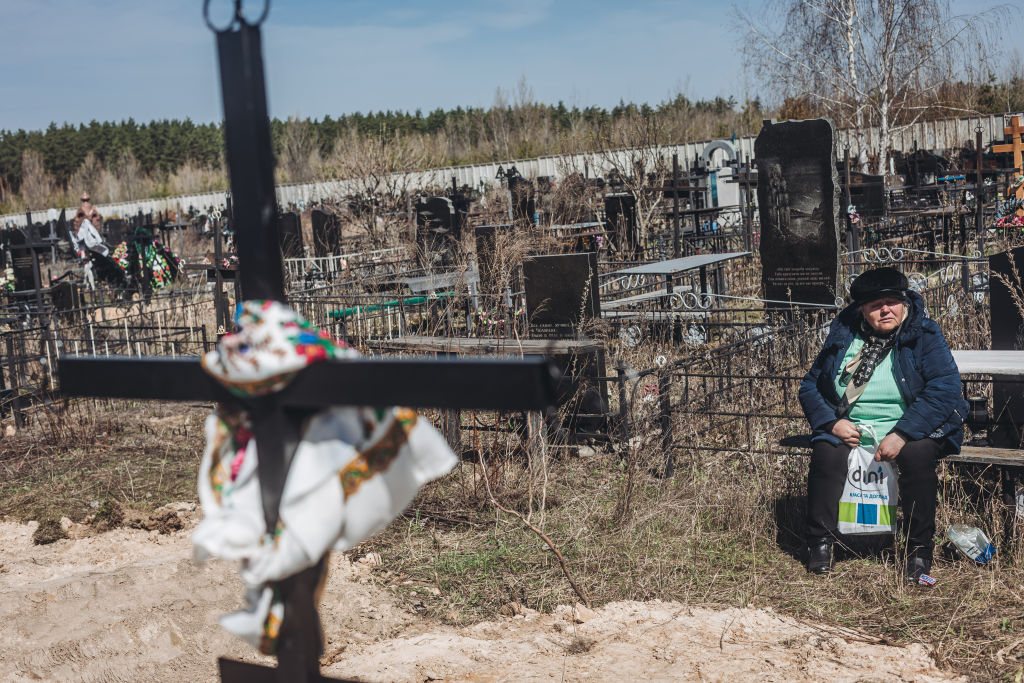
The ubiquitous Ukrainian flags, concerts for Ukraine, statehouses, opera houses and monuments alit in yellow and blue, ribbons, emojis, a spot on the Grammys for Volodymyr Zelensky; and the weapons—drones, surface to air missiles, ammunition, armored personnel carriers (no MiGs, but still)—all reflect an incredible solidarity with a nation under attack. The outpouring for Ukraine has been stupendous, a testament to the powerful advocacy of a heroic political leader, to be sure, but also to the very public brutality of the Russians. But how meaningful is the emotional and highly visible support? In the long run, if history is any guide, not very.
Look at a picture from Bucha:

This is what human rights advocacy is for; the very moment for which the United Nations was created; the reason all those treaties against torture and violence against civilians and the laws of war were written; why alliances were forged. Even YouTube and Twitter are validated by the publicity the platforms have brought to Russia’s brutality. This is the moment that the world’s greatest democracy and her people can stand tall.
So, here’s another picture:

This is a child killed in a chemical weapons attack in Syria. And here’s another:
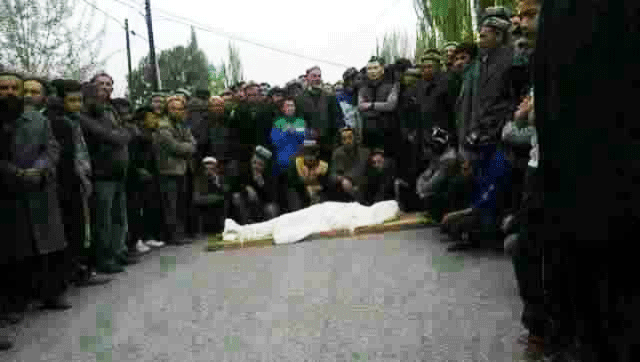
This is a Uyghur teen killed in Xinjiang, China, one of almost a million killed, sterilized, interned in concentration camps. How about this photo:

A starving child in Afghanistan. It seems mere moments ago that the world was scandalized by America’s retreat from Afghanistan, and its subsequent abandonment of the nation to the Taliban. Now there are “millions on the brink of starvation.” Women and girls are barred from school, and death squads hunt collaborators while the Biden administration celebrates the “end” to the war.
What have been the consequences of these atrocities? Some sanctions to be sure, but the Olympics were recently hosted by the same authorities that have ordered a million Muslims into camps in China’s Xinjiang province. Syrian authorities have been hit with sanctions as well, and there is a tiny contingent of U.S. troops still in the northwest; of course, they’re not there to protect Syria’s civilians, but to fight ISIS, al-Qaeda and other Salafis. And the United States and some of its Arab friends are in the process of trying to readmit Syrian dictator Bashar al-Assad into the community of civilized nations.
In Afghanistan, the Biden administration is giving hundreds of millions in humanitarian assistance (necessitated by the United States’ precipitate handoff to the Taliban). But little is being done—other than periodic exhortations—to address the Taliban’s crackdown on women, former U.S. allies and others who oppose their extremist Islamist agenda. Rather, Afghanistan is almost forgotten, with many of the refugees admitted to the United States still languishing on military bases and at hotels, essentially homeless.
Still, these horrors in China, Syria and Afghanistan remain on the event horizon, almost visible, but quickly being pulled into the black hole of historical memory. There are so many more that have been forgotten completely: terrorist horrors in Somalia; hundreds of thousands dead in Yemen; ethnic cleansing in Burma; murder, torture and detention of dissidents in Iran. Some of those stories even made the front page. One such tale in Nigeria was stirring enough to deserve a tweet from Michelle Obama.
In the end, this is the problem: “Never again” is little more than a slogan. Indeed, we’re even forgetting the Holocaust that spawned the never again pledge. The international agencies intended to deal with the challenge of human rights violations like the U.N. Human Rights Council are tantamount to a joke. So-called “peacekeeping” forces rarely keep the peace, and in recent years are better known for sexual assault and spreading disease. The High Commission for Refugees, another U.N. agency, has been accused of caring more for its personnel than for refugees. There are myriad private organizations that support the human tsunamis that flood from war zones, but even they are subject to the vagaries of human rights fashion.
Pondering this question, some activists note a difference between attacks against foreigners—Russia on Ukraine—versus attacks on one’s own people, like in Syria or China, for example. Somehow, the violation of sovereignty and national borders is viewed as an international problem; killing one’s own is a domestic affair. Others note that Ukraine is more evocative because Ukrainians “look like us.” Or that we have “compassion fatigue.” Realpolitik aficionados point out that humanitarian crises that don’t intersect with U.S. national security interests—much of what happens in Africa and South America, for example—don’t merit American expenditure of capital, either political or financial.
The problem is that all these explanations fly in the face of the Biden administration’s repeated pronouncements about fighting genocide and the importance of human rights and democracy. “Will we allow the backward slide of rights and democracy to continue unchecked?” President Biden asked at the global Summit for Democracy. “Or will we together—together—have a vision and the vision … and courage to once more lead the march of human progress and human freedom forward?” Answer? Well, it depends; sometimes yes, sometimes no. In reality, there is precious little connection between the president’s speeches and his administration’s foreign policy. Were there such a connection, the price being paid by the Chinese Communist Party, the Russians and so many others would be far higher.
Many have remarked on the disconnect between the red lines laid down by successive presidents and U.S. policy. Even in the case of Ukraine, which has stirred unprecedented unity of action in the West, there remain enormous loopholes in Russia sanctions. The European Union cannot wean itself from Russian oil and gas; the United States cannot fully steel itself to providing needed weaponry to Kyiv, as the aborted attempt to send them MiGs demonstrates. Even Germany’s much ballyhooed reversal of years of pacifism and accommodation is now faltering, as Chancellor Olaf Scholz—of the Green Party—is unwilling to ban Russian oil and gas imports and is reluctant to rush any armored vehicles to Ukraine. The problem highlights the tightrope that all democratic political leaders walk—matching policy to rhetoric without inflicting intolerable economic pain on the voter.
Ultimately, however, the larger point is that the sound and fury of human rights policy is just that. Of course, even a nation as rich and powerful as the United States cannot fix every deviation from democratic norms. But if the Biden administration, its predecessors and our allies had been more serious about matching word to deed, they would have considered the demonstrated connection between human rights violations and greater predations on the global order. Or to put it even more bluntly, perhaps if there had been consequences for Vladimir Putin’s abrogation of democracy and human rights violations many years ago, he might have thought twice about invading Ukraine.
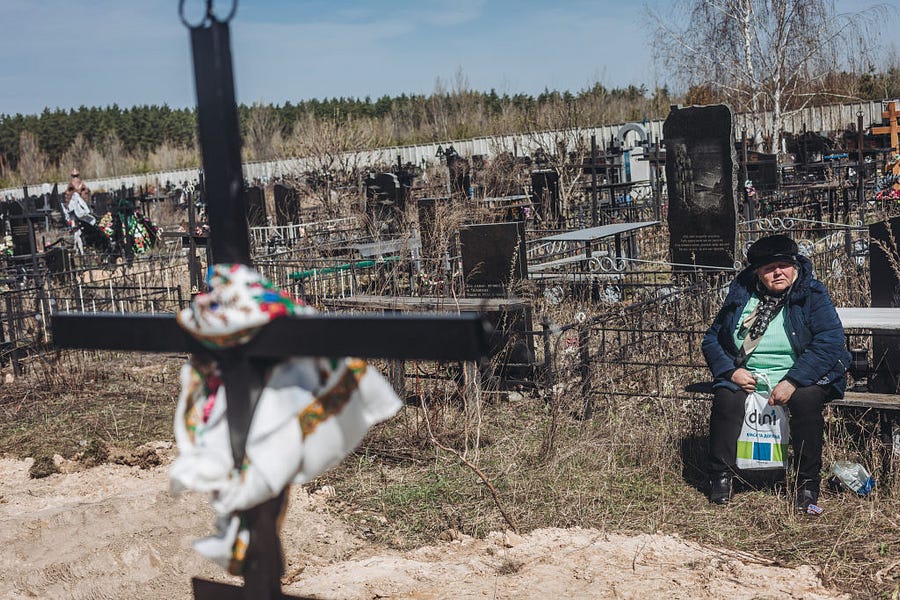
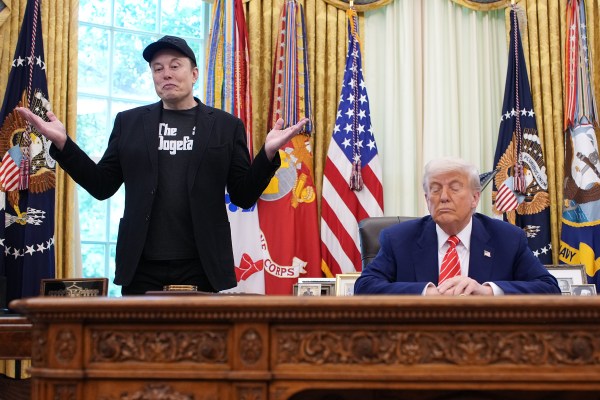


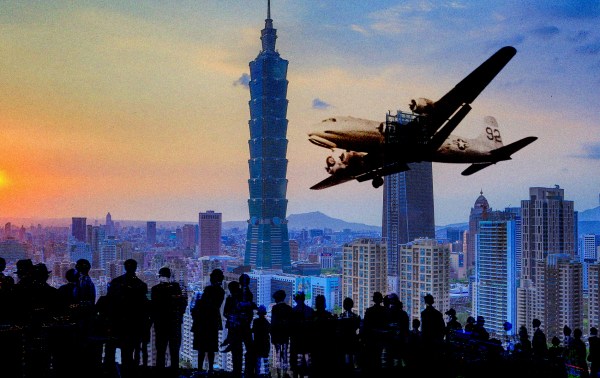

Please note that we at The Dispatch hold ourselves, our work, and our commenters to a higher standard than other places on the internet. We welcome comments that foster genuine debate or discussion—including comments critical of us or our work—but responses that include ad hominem attacks on fellow Dispatch members or are intended to stoke fear and anger may be moderated.
With your membership, you only have the ability to comment on The Morning Dispatch articles. Consider upgrading to join the conversation everywhere.